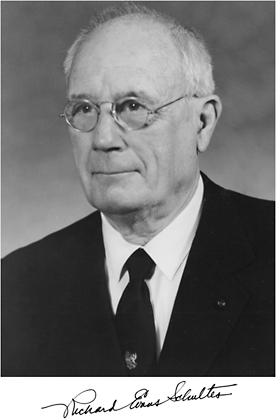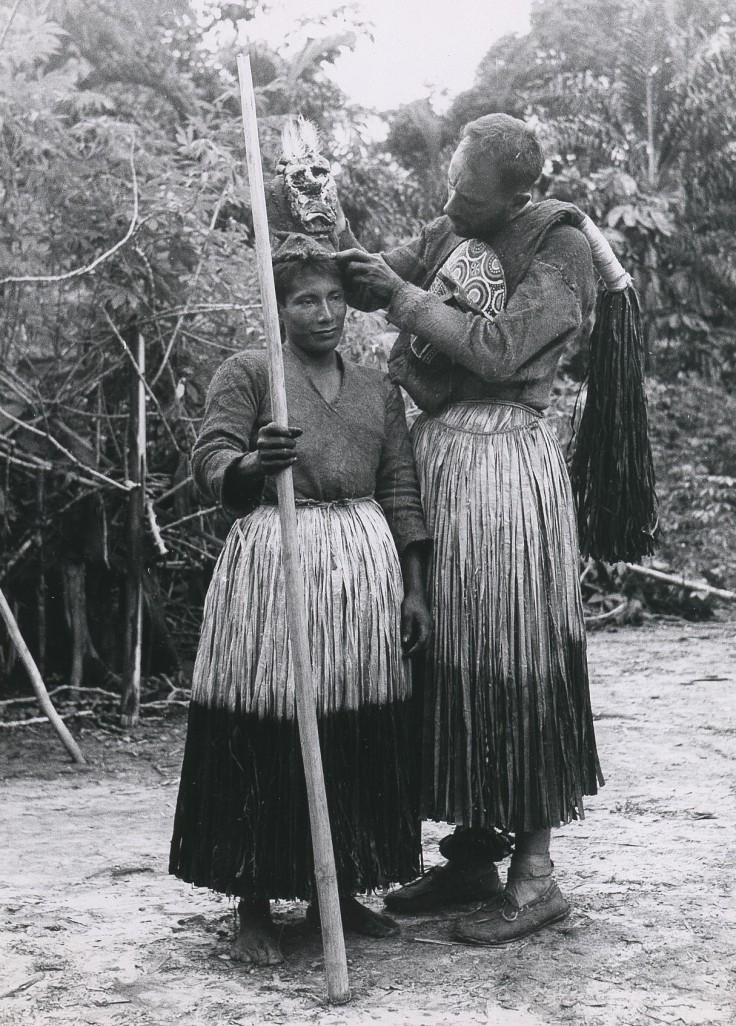DEADLINE, March 15th, 2017.
The Schultes Award was created in 2001 to honor the late Dr. Richard Evans Schultes. The award is to be presented annually to a graduate student who is a member of the Society, or a member who has received their degree within a year.
Richard E. Schultes (12 January 1915-10 April 2001): A Tribute by Sir Ghillean T. Prance (includes Schultes bibliography)
Richard E. Schultes – Academy of Achievement Biography

The Society for Economic Botany announces the offering of an annual student research award(s) of up to $2500. The award is intended to help defray the costs of field work on a topic related to economic botany. Competition is limited to graduate students who are members of the Society or members who have received their degree within a year. Applicants will be judged by an ad-hoc committee of Society members and awards will be granted by June 30 each year. Recipients are expected to submit a manuscript based on their proposed research for publication in Economic Botany.
Proposals should include:
(1) An email message from your major advisor confirming current MS, PhD or Post-doc status. They may provide a supporting letter of recommendation as well.
(2) Each applicant must submit a single .pdf file which includes;
a) 2 pages describing the proposed research including literature cited,
b) 1 page tabular budget which identifies how funds will be allocated,
c) 1 page resume
(3) Name your file correctly using first initial_lastname (Ex: j_smith.doc)
(4) Email proposal to schultesaward@econbot.org. You should receive an email confirmation of receipt of your materials within 72 hours. If you do not, please contact seb@econbot.org.
Schultes Award Reporting Protocol
Within nine months of receiving the award, the recipient will submit one to two page double-spaced narrative of their respective project that includes:
a) Title of project, year of grant, your name, affiliated organizations
b) Contacts made (people & organizations) that were helpful
c) Geographic and place names of research locations
d) Description of vegetation and terrain
e) Where the collections are / will be deposited
f) Broader impacts / significance of research
g) One or two photos
DEADLINE, March 15th, 2017.
schultesaward@econbot.org

SCHULTES AWARD RECIPIENTS
2016
Michael Coe and Richard Tate,
Research In-Progress
2015
Anne Lucy S. Virnig, The Graduate Center, City University of New York, “From molecular systems to human systems: An interdisciplinary approach to evaluating antioxidant activity and conservation in the neotropical blueberries.”
Research In-Progress
2014
Tegan McGillivray, University of Wisconsin-Madison, she did not supply a title for her project. Her request was for support to undertake field research at a series of comparable Bronze and Iron Age sites located along the Red River, Vietnam.
Research In-Progress
2013
Lauren Moscoe, University of Wisconsin-Madison, “Oca (Oxalis tuberosa) diversity and population structure in two communities in Cusco, Peru.”
Research In-Progress
2012
Hugo De Boer, Uppsala University, “Steam sauna, hot beds and mother roasting: Medicinal plants and postpartum recovery among the Brou, Sake and Kry (Laos).”
Research In-Progress
2011
Paula Brown, University of British Columbia Okanagan, “Kava (Piper methysticum): A Traditional Crop in Modern Markets.”
Research In-Progress
2010
Sushma Shrestha, Miami University, “Global Localism at the Manaslu Conservation Area in the Eastern Himalayas, Nepal: Integrating ecological and ethnobotanical knowledge about forests for biodiversity conservation.”
Research In-Progress
2009
Ashley DuVal, Yale School of Forestry, “Domestication of Açaí in Home Gardens of the Amazon Estuary.”
Research In-Progress
2008
Lisa Mandle, University of Hawai`i at Manoa, “The Effects of Landscape Management and Harvesting Practices on Non-timber Forest Product Populations and Communities in the Nilgiri Biosphere Reserve, India.”
Research In-Progress
2007
Nanci J. Ross, University of Connecticut, “Impact Assessment of Ancient Maya Forest Gardens.”
Research In-Progress
2006
Anthony Amend, University of Hawai`i at Manoa, “Harvesting Effects and Population Genetics of Tricholoma matsutake in Shangri-La, China.”
2005
Andrew S. Roberts, City University of New York, Institute of Economic Botany, New York Botanical Garden, “Fields in Transition, Livelihoods in Transition: agrodiversity and incremental change in smallholder managed landscapes in Cambodia.”
Research In-Progress
2004
Heather McMillen, University of Hawai`i at Manoa, “Ethnoecology of Medicinal Plants in Tanzania.”
2003
Christiane Ehringhaus, Yale University, “Post-victory Challenges: Non-timber Forest Product Use and Marketing in Amazonian Extractive Reserves.”
Honorable Mention
Jennifer Crus-Sanders and Angela Steward
2002
Michael P. Gilmore, Miami University, “An Ethnobiological and Ethnoecological Study of the Maijuna Indians, Peruvian Amazon.”
Patrick Owen, McGill University, “Antidiabetic Properties of Traditional Food and Medicinal Plants Used for the Treatment of NIDDM among Transitional Communities of Papua New Guinea.”
Julie L. Velasquez Runk, Yale University “And the Creator Began to Carve Us of Cocobolo: Historical Ecology of Wbunaan Forest Use in Eastern Panama.”
Honorable Mention
Amanda Koch, University of Illinois, Chicago, “Medical Ethnobotany of the Maasai.”

Leave a comment